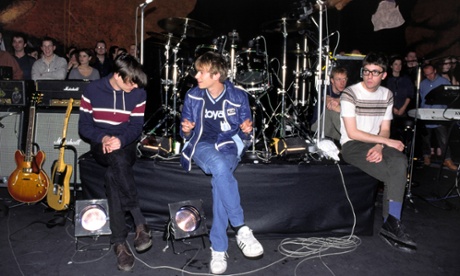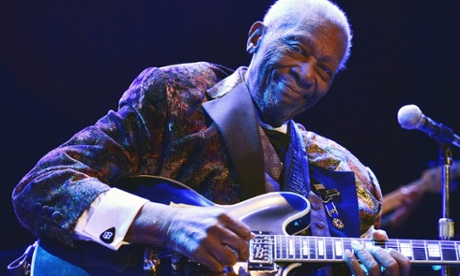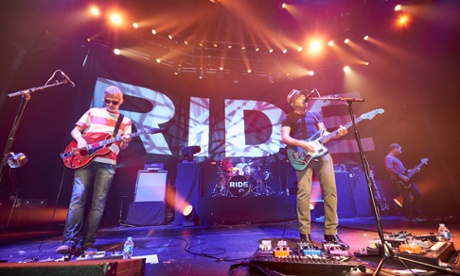It might have looked like an innocent pop single, but what Blur released 20 years ago this Friday was more like an act of war. Girls & Boys camouflaged itself well: on the surface it was a gaudy tale of holidaymakers trading STDs in Kavos, recounted over trashy electro. But bubbling away underneath was the culmination of a plan that had hatched in Damon Albarn’s mind many months before: how to halt the pervading Americanisation of guitar music and reassert some belief into a British scene suffering from an identity crisis.
“If punk was about getting rid of hippies, then I’m getting rid of grunge!” was how Albarn phrased it to the NME’s John Harris back in 1993. And that was the atmosphere in which Girls & Boys – the first single from Parklife and a top-five hit – emerged. Fred Perrys instead of plaid shirts. Songs that referenced the shipping forecast. Photoshoots with mastiff dogs centre stage. If Parklife’s predecessor Modern Life is Rubbish had hinted at these themes – and not for nothing did Albarn toy with the idea of calling it England v America – then Parklife was the full-on assault.
Albarn’s mission had personal venom behind it. Blur had been pop stars, briefly, when There’s No Other Way made the top 10 in 1991, but had since been made to look irrelevant by the visceral force of bands such as Nirvana.
The band also had back-up, in the sense that their peers – and the press – were united in striking a blow for Britain’s rich musical heritage. Shortly before Girls & Boys was released, Select magazine put Suede’s Brett Anderson on its cover, baring his midriff in front of the union jack and the charmingly inclusive tagline “Yanks Go Home!” Pulp’s Jarvis Cocker could be found inside praising British pop for finding a “sense of the romantic in the everyday. You don’t get that much in American rock.” Noel Gallagher might have beefed up Oasis songs on hearing Nevermind, but he later admitted that songs such as Live Forever reflected his own desire to put one over Cobain and co: “I remember Nirvana had a tune called I Hate Myself and I Want to Die, and I was like, ‘Well, I’m not fucking having that’ … I can’t have people like that coming over here, on smack, fucking saying that they hate themselves and they wanna die. That’s fucking rubbish.”
Girls & Boys spearheaded perhaps the last big battle between British and American guitar scenes, where two distinct musical styles fought it out for pop cultural dominance. Nowadays, in a world where anyone with a broadband connection can sound convincingly like a Soweto gospel choir, it’s hard to imagine such a scrap getting off the ground. Musical styles rarely have enough time to incubate away from the limelight.
Perhaps this is why British music has tended to sound more and more similar to its US equivalent ever since. The Libertines were perhaps the last successful band to position themselves as ostensibly British, although even they shared sonic similarities (and a label) with their US counterparts The Strokes. Arctic Monkeys might have emerged from Sheffield sounding as British as a hurled pint of Boddingtons, but by their third album they were recording in the California desert. Wild Beasts’ recent single Wanderlust did contain the line “In your mother tongue what’s the verb to suck?” – interpreted as a swipe at UK bands who sing in phoney US accents - but it sounded more like a skirmish on some distant territory than a charging off the barricades.
It would be nice to say that modern British guitar music has simply become more representative of our country’s multiculturalism, to the extent that we no longer need to cling to tired patriotic cliches to maintain a sense of identity. But unlike the UK’s vibrant pop and dance scenes, the kind of homegrown guitar music that sells – Bombay Bicycle Club, the 1975, Bastille et al – seems to reflect the vibrancy of modern Britain far less than Blur, Oasis or Pulp ever did.
Last year, when Mumford & Sons collected the Grammy for best album, American fans took to Twitter to express surprise that this band – all banjos and beards – were British at all. For all Girls & Boys’ efforts it seems the US, perhaps inevitably, won the overall war. Yet we should remember fondly a time when British guitar pop had the cheek to try to win a few battles.











